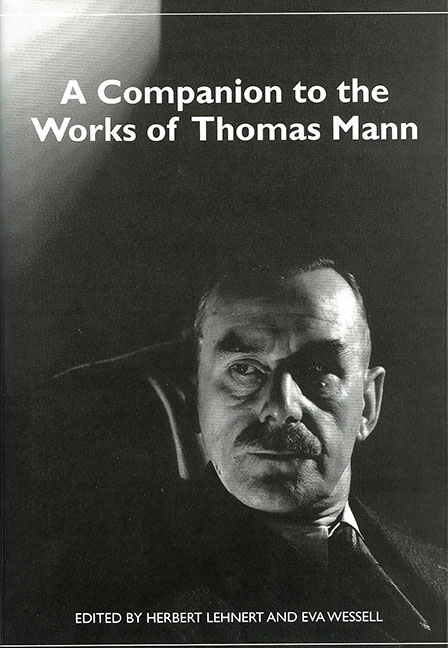Book contents
- Frontmatter
- Contents
- Foreword
- Thomas Mann's Works
- List of Abbreviations
- Introduction
- Thomas Mann's Beginnings and Buddenbrooks
- Art and Society in Thomas Mann's Early Novellas
- Love in Society: Thomas Mann's Early Stories
- “Death in Venice”
- “Mein ‘Friedrich’ — das ist was Anderes”: Thomas Mann's Unwritten Novel about Frederick the Great, King of Prussia
- Magic and Reflections: Thomas Mann's The Magic Mountain and His War Essays
- Thomas Mann's “Autobiographical” Stories
- Joseph and His Brothers
- Lotte in Weimar
- Thomas Mann's Late Politics
- “German” Music and German Catastrophe: A Re-Reading of Doktor Faustus
- The Gaze of Love, Longing, and Desire in Thomas Mann's “The Transposed Heads” and “The Black Swan”
- Felix Krull
- Female Identities and Autobiographical Impulses in Thomas Mann's Work
- Betrayed or Not Betrayed: A Testament?
- Thomas Mann's Comedies
- Notes on the Contributors
- Select Bibliography
- Index
The Gaze of Love, Longing, and Desire in Thomas Mann's “The Transposed Heads” and “The Black Swan”
Published online by Cambridge University Press: 28 April 2017
- Frontmatter
- Contents
- Foreword
- Thomas Mann's Works
- List of Abbreviations
- Introduction
- Thomas Mann's Beginnings and Buddenbrooks
- Art and Society in Thomas Mann's Early Novellas
- Love in Society: Thomas Mann's Early Stories
- “Death in Venice”
- “Mein ‘Friedrich’ — das ist was Anderes”: Thomas Mann's Unwritten Novel about Frederick the Great, King of Prussia
- Magic and Reflections: Thomas Mann's The Magic Mountain and His War Essays
- Thomas Mann's “Autobiographical” Stories
- Joseph and His Brothers
- Lotte in Weimar
- Thomas Mann's Late Politics
- “German” Music and German Catastrophe: A Re-Reading of Doktor Faustus
- The Gaze of Love, Longing, and Desire in Thomas Mann's “The Transposed Heads” and “The Black Swan”
- Felix Krull
- Female Identities and Autobiographical Impulses in Thomas Mann's Work
- Betrayed or Not Betrayed: A Testament?
- Thomas Mann's Comedies
- Notes on the Contributors
- Select Bibliography
- Index
Summary
In diary entries of 1950, the year in which Thomas Mann encountered his last love, the nineteen-year-old waiter Franz Westermeier, a year in which he also was smitten by the sight of a number of other young men, Mann repeatedly links gazing at the face or the body of a youth and the emotional experience of falling in love (Tb 19 July, 15 August, 25 August 1950). In yet another diary entry, however, he questions this connection. Commenting on his last encounter with Westermeier in August 1950, he writes that his love for the “excitant” (Erreger) (Tb 11 July 1950) involved an extreme liking, an attachment from the bottom of his heart (Tb 15 August 1950). Yet he asks himself if the source of his fascination with Westermeier was not primarily his enchanted sensual perception rather than his heart (Tb 15 August 1950). The same uncertainty surfaces when Mann comments on his travels, which are always partly undertaken in the hope of “amorous adventures” (Tb 28 August 1950). He records either his gratitude or his disappointment when the trips offered — or failed to offer — something “for the heart” (Tb 3 July 1950) or a “gift for the eye” (Tb 29 August 1950). Mann's personal experience of gazing covertly and erotically at faces and bodies, together with his reflections on the significance of this, shaped his understanding of love as strongly as his reading of Schopenhauer's “Metaphysik der Geschlechtsliebe” (The Metaphysics of Sexual Love), Plato, Freud, Nietzsche, and Plutarch.
Two of the last stories in Thomas Mann's oeuvre, “Die vertauschten Köpfe” (The Transposed Heads), written in the early part of 1940 and “Die Betrogene” (The Black Swan), written from 1952 to 1953, are centered on the problem of love and the “secret of the erotic” (Tb 19 August 1950). One may indeed go so far as to claim that, in a condensed form, these two texts sum up Mann's thoughts on the relationship between love and sensuality, the “heart” and the “eye.”
- Type
- Chapter
- Information
- A Companion to the Works of Thomas Mann , pp. 245 - 256Publisher: Boydell & BrewerPrint publication year: 2004



